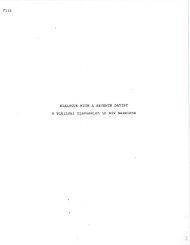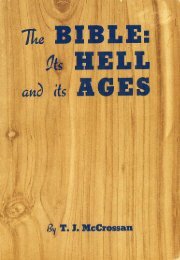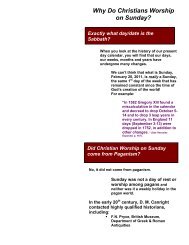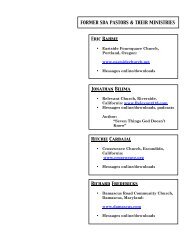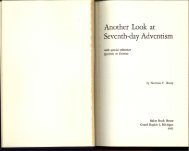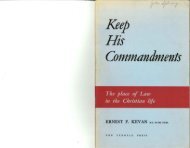Discovering the New Covenant by Greg Taylor - exAdventist Outreach
Discovering the New Covenant by Greg Taylor - exAdventist Outreach
Discovering the New Covenant by Greg Taylor - exAdventist Outreach
You also want an ePaper? Increase the reach of your titles
YUMPU automatically turns print PDFs into web optimized ePapers that Google loves.
SABBATH IN THE OLD TESTAMENT<br />
writing as well. As we studied earlier, Mark’s Gospel<br />
makes a comment about clean and unclean foods based on<br />
Jesus’ discussion with <strong>the</strong> Pharisees. Jesus did not state<br />
directly that <strong>the</strong> food laws were going to be obsolete, but<br />
Mark, from his vantage point after <strong>the</strong> Cross applies it that<br />
way. Was this Genesis account one of those after-<strong>the</strong>-fact<br />
statements based on Moses’ vantage point? Was Moses<br />
writing to <strong>the</strong> Children of Israel about God blessing and<br />
setting apart <strong>the</strong> seventh day from <strong>the</strong>ir perspective or vantage<br />
point? If so, <strong>the</strong> fact that <strong>the</strong> name “Sabbath” was<br />
omitted is even more significant.<br />
Since ei<strong>the</strong>r <strong>the</strong> creation ordinance of <strong>the</strong> Sabbath or<br />
<strong>the</strong> later ordinance interpretation honor <strong>the</strong> text, I needed to<br />
study fur<strong>the</strong>r to see if <strong>the</strong> context of <strong>the</strong> Old Testament<br />
gives a clue as to which is correct. What deeply impacted<br />
me was <strong>the</strong> clarity of <strong>the</strong> o<strong>the</strong>r texts on this subject. They<br />
state exactly which way to interpret <strong>the</strong>se texts. There is no<br />
need for confusion. We don’t have to speculate as to<br />
whe<strong>the</strong>r Moses was writing from <strong>the</strong> post-Law vantage<br />
point or not. One thing I have found in my studies, on<br />
important issues God always provides at least three or more<br />
Scriptures to make sure we are not led astray. 1 He does not<br />
1 This is one reason <strong>the</strong> Adventist doctrine of <strong>the</strong> investigative<br />
judgment is so shaky in my opinion. It is based on one text that comes<br />
from an obscure passage of apocalyptic literature. It is complicated <strong>by</strong><br />
<strong>the</strong> fact that <strong>the</strong> immediate context does not appear to be talking about a<br />
heavenly but an earthly issue. It is connected to o<strong>the</strong>r Scripture <strong>by</strong> <strong>the</strong><br />
weakest of linguistic ties, and it ignores <strong>the</strong> actual wording of <strong>the</strong><br />
evening and morning sacrificial imagery within <strong>the</strong> text. In order to<br />
make <strong>the</strong> horn power of Daniel 8 fit <strong>the</strong> Adventist scenario, one must<br />
make this horn grow out of one of <strong>the</strong> winds ra<strong>the</strong>r than <strong>the</strong> horns of <strong>the</strong><br />
Grecian empire where it logically fits. The obvious connection to<br />
Antiochus Epiphanes is ignored. To base an entire doctrine on such a<br />
stretch is highly suspect. There are no biblical scholars outside of<br />
Adventism who agree with <strong>the</strong> SDA interpretation. This ought to throw<br />
up a caution sign for making too many dogmatic claims. Essentially <strong>the</strong><br />
SDA position has one weak text and Ellen G. White for support. That<br />
doesn’t sound like <strong>the</strong> Bible and <strong>the</strong> Bible only to me.<br />
117



